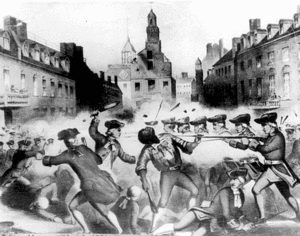Crispus Attucks
|
|
Crispus_Attucks.jpg
Crispus Attucks (c.1723–March 5, 1770), is traditionally accounted the first casualty in the American Revolution. Attucks, whom made his home in the town of Framingham, Massachusetts, approximately 17 miles away, was a runaway slave with African American and Native American ancestry. An October 2,1750 advertisement placed in the Boston Gazette referred to him: " ran away from his Master William Brown from Frammingham, on the 30th of Sept. last, a Mollato Fellow, about 27 years of age, named Crispas, 6 Feet two inches high, short curl'd Hair, his Knees near toghther than common: had on a light colour'd Bearskin Coat. " The owner offered a reward of 10 pounds for his return. He had become a sailor and laborer, and joined a crowd of 30 or so workers protesting against the presence of British troops in Boston.
Boston had been under military occupation since 1768. Colonial sailors resented the presence of the British because of the danger of press gangs. Other workers in Boston were disturbed because British soldiers worked part-time jobs at low wages in order to supplement their army pay, which potentially took away jobs and drove down wages for colonial workers. Revolutionaries such as Samuel Adams encouraged protest against the soldiers.
Tensions had been rising over the weekend when the crowd appeared before the British barracks. Attucks has been often depicted as one of the leaders of the crowd who defied the British. Eventually, in spite of attempts by their officers to prevent it, the soldiers fired, killing five members of the crowd, Attucks and four white men.

Sam Adams's cousin, John Adams, successfully defended the British soldiers against a charge of murder, calling the crowd "a motley rabble of saucy boys, negroes and molattoes, Irish teagues and outlandish jack tarrs".
Sam Adams, on the other hand, gave the event the name of the Boston Massacre and assured that it would not be forgotten. The five who were killed were buried as heroes in the Granary Burying Ground, despite laws against burying blacks with whites.
Some controversy remains over whether Attucks was a revolutionary leader or a rabble rouser, but it is possible that in that time, he was both. The Boston Massacre was an important event that underscored the commitment of ordinary Americans to the ideas of the coming revolution.
Martin Luther King, Jr. referred to Crispus Attucks in the introduction of Why We Can't Wait as a specific example of a man whose contribution to history has been overlooked by standard histories.
Recent evidence suggests that Crispus Attucks was not literally the first man to be killed, but that he was struck by a bullet deflected from another person.
External links
- Africans in America biography (http://www.pbs.org/wgbh/aia/part2/2p24.html)
- The Murder of Crispus Attucks (http://www.loc.gov/exhibits/treasures/trr046.html) Library of Congress exhibit, including trial documents.
